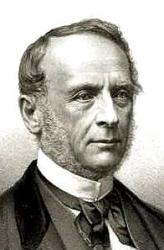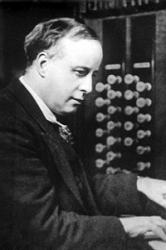Planning worship?
Check out our sister site, ZeteoSearch.org,
for 20+ additional resources related to your search.
- |
User Links
Person Results
Virgil Corydon Taylor
1817 - 1891 Person Name: Virgil C. Taylor Composer of "LOUVAN" in Hymns of the Kingdom of God
Virgil Corydon Taylor
John Sterling
1806 - 1844 Author of "O source divine and life of all" in Christian Worship and Praise Sterling was born at Kames Castle, Bute, July 20, 1806, and died at Ventnor, Isle of Wight, Sep. 18, 1844.
--John Julian, Dictionary of Hymnology, Appendix, Part II (1907
================
Sterling, J., p. 1595, ii. (Under "When up to nightly skies," &c.) Another of his hymns which was given in the American Hymns of the Spirit, 1864 and Martineau's Hymns of Praise and Prayer, 1873, No. 31, "0 Source divine and Life of all" (Reverence and Love), has passed into a few modern American collections, including The Pilgrim Hymnal, 1904. It is dated 1840.
--John Julian, Dictionary of Hymnology, New Supplement (1907)
John Sterling
John Bacchus Dykes

1823 - 1876 Person Name: John B. Dykes, 1823-1876 Composer of "TRINITY COLLEGE" in Hymns for Schools and Colleges As a young child John Bacchus Dykes (b. Kingston-upon-Hull' England, 1823; d. Ticehurst, Sussex, England, 1876) took violin and piano lessons. At the age of ten he became the organist of St. John's in Hull, where his grandfather was vicar. After receiving a classics degree from St. Catherine College, Cambridge, England, he was ordained in the Church of England in 1847. In 1849 he became the precentor and choir director at Durham Cathedral, where he introduced reforms in the choir by insisting on consistent attendance, increasing rehearsals, and initiating music festivals. He served the parish of St. Oswald in Durham from 1862 until the year of his death. To the chagrin of his bishop, Dykes favored the high church practices associated with the Oxford Movement (choir robes, incense, and the like). A number of his three hundred hymn tunes are still respected as durable examples of Victorian hymnody. Most of his tunes were first published in Chope's Congregational Hymn and Tune Book (1857) and in early editions of the famous British hymnal, Hymns Ancient and Modern.
Bert Polman
John Bacchus Dykes
F. Venua
1788 - 1872 Person Name: F. M. A. Venua Composer of "PARK STREET" in Songs for the Lord's House Frederic Marc Antoine Venua; English composer
Evangelical Lutheran Hymnal, 1908
Born to an Italian family in France, Venua attended the Paris Conservatory, and studied composition in London.
He directed and composed for the ballet orchestra at the King’s Theater, and belonged the British Royal Society of Musicians.
He retired to Exeter in 1858.
© The Cyber Hymnal™ (http://www.hymntime.com/tch/bio/v/e/n/u/venua_fma.htm">Frederick Marc Antoine Venua)
F. Venua
Christopher Edwin Willing
1830 - 1904 Person Name: Christopher E. Willing Composer of "ALSTONE" in Hymns for the Living Age Christopher Edwin Willing; Devon, England, 1830
Evangelical Lutheran Hymnal, 1908
Christopher Edwin Willing
J. P. E. Hartmann

1805 - 1900 Composer of "WASLI" in Immanuel Hymnal Born: May 14, 1805, Copenhagen, Denmark.
Died: March 10, 1900.
J. P. E. Hartmann
Henry G. Ley

1887 - 1962 Composer of "RUSHFORD" in Hymnal for Colleges and Schools Born: December 30, 1887, Chagford, Devonshire, England.
Died: August 24, 1962, near Ottery, Devonshire, England.
Ley trained as a chorister at St. George’s Chapel, Windsor, as a music scholar at Uppingham, the Royal College of Music, and as an organ scholar at Keble College, Oxford. He was Precentor of Radley College; organist at Christ Church Cathedral, Oxford (1909-26); Choragus of the University, Oxford; professor of the organ at the Royal College of Music (1919); and organist at Eton College.
Sources:
Frost, p. 680
West, p. 87
http://www.hymntime.com/tch/bio/l/e/y/ley_hg.htm
Henry G. Ley
Orlando Gibbons

1583 - 1625 Composer of "SONG 34" in Hymns of the Spirit for Use in the Free Churches of America Orlando Gibbons (baptised 25 December 1583 – 5 June 1625) was an English composer, virginalist and organist of the late Tudor and early Jacobean periods. He was a leading composer in the England of his day.
Gibbons was born in Cambridge and christened at Oxford the same year – thus appearing in Oxford church records.
Between 1596 and 1598 he sang in the Choir of King's College, Cambridge, where his brother Edward Gibbons (1568–1650), eldest of the four sons of William Gibbons, was master of the choristers. The second brother Ellis Gibbons (1573–1603) was also a promising composer, but died young. Orlando entered the university in 1598 and achieved the degree of Bachelor of Music in 1606. James I appointed him a Gentleman of the Chapel Royal, where he served as an organist from at least 1615 until his death. In 1623 he became senior organist at the Chapel Royal, with Thomas Tomkins as junior organist. He also held positions as keyboard player in the privy chamber of the court of Prince Charles (later King Charles I), and organist at Westminster Abbey. He died at age 41 in Canterbury of apoplexy, and a monument to him was built in Canterbury Cathedral. A suspicion immediately arose that Gibbons had died of the plague, which was rife in England that year. Two physicians who had been present at his death were ordered to make a report, and performed an autopsy, the account of which survives in The National Archives:
We whose names are here underwritten: having been called to give our counsels to Mr. Orlando Gibbons; in the time of his late and sudden sickness, which we found in the beginning lethargical, or a profound sleep; out of which, we could never recover him, neither by inward nor outward medicines, & then instantly he fell in most strong, & sharp convulsions; which did wring his mouth up to his ears, & his eyes were distorted, as though they would have been thrust out of his head & then suddenly he lost both speech, sight and hearing, & so grew apoplectical & lost the whole motion of every part of his body, & so died. Then here upon (his death being so sudden) rumours were cast out that he did die of the plague, whereupon we . . . caused his body to be searched by certain women that were sworn to deliver the truth, who did affirm that they never saw a fairer corpse. Yet notwithstanding we to give full satisfaction to all did cause the skull to be opened in our presence & we carefully viewed the body, which we found also to be very clean without any show or spot of any contagious matter. In the brain we found the whole & sole cause of his sickness namely a great admirable blackness & syderation in the outside of the brain. Within the brain (being opened) there did issue out abundance of water intermixed with blood & this we affirm to be the only cause of his sudden death.
His death was a shock to peers and the suddenness of his passing drew comment more for the haste of his burial – and of its location at Canterbury rather than the body being returned to London. His wife, Elizabeth, died a little over a year later, aged in her mid-30s, leaving Orlando's eldest brother, Edward, to care for the children left orphans by this event. Of these children only the eldest son, Christopher Gibbons, went on to become a musician.
One of the most versatile English composers of his time, Gibbons wrote a quantity of keyboard works, around thirty fantasias for viols, a number of madrigals (the best-known being "The Silver Swan"), and many popular verse anthems. His choral music is distinguished by his complete mastery of counterpoint, combined with his wonderful gift for melody. Perhaps his most well known verse anthem is This is the record of John, which sets an Advent text for solo countertenor or tenor, alternating with full chorus. The soloist is required to demonstrate considerable technical facility at points, and the work at once expresses the rhetorical force of the text, whilst never being demonstrative or bombastic. He also produced two major settings of Evensong, the Short Service and the Second Service. The former includes a beautifully expressive Nunc dimittis, while the latter is an extended composition, combining verse and full sections. Gibbons's full anthems include the expressive O Lord, in thy wrath, and the Ascension Day anthem O clap your hands together for eight voices.
He contributed six pieces to the first printed collection of keyboard music in England, Parthenia (to which he was by far the youngest of the three contributors), published in about 1611. Gibbons's surviving keyboard output comprises some 45 pieces. The polyphonic fantasia and dance forms are the best represented genres. Gibbons's writing exhibits full mastery of three- and four-part counterpoint. Most of the fantasias are complex, multisectional pieces, treating multiple subjects imitatively. Gibbons's approach to melody in both fantasias and dances features a capability for almost limitless development of simple musical ideas, on display in works such as Pavane in D minor and Lord Salisbury's Pavan and Galliard.
In the 20th century, the Canadian pianist Glenn Gould championed Gibbons's music, and named him as his favorite composer. Gould wrote of Gibbons's hymns and anthems: "ever since my teen-age years this music ... has moved me more deeply than any other sound experience I can think of." In one interview, Gould compared Gibbons to Beethoven and Webern:
...despite the requisite quota of scales and shakes in such half-hearted virtuoso vehicles as the Salisbury Galliard, one is never quite able to counter the impression of music of supreme beauty that lacks its ideal means of reproduction. Like Beethoven in his last quartets, or Webern at almost any time, Gibbons is an artist of such intractable commitment that, in the keyboard field, at least, his works work better in one's memory, or on paper, than they ever can through the intercession of a sounding-board.
To this day, Gibbons's obit service is commemorated every year in King's College Chapel, Cambridge.
--wikipedia.org
Orlando Gibbons


 My Starred Hymns
My Starred Hymns

